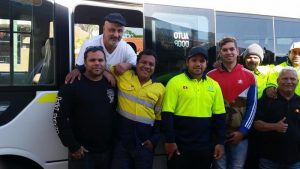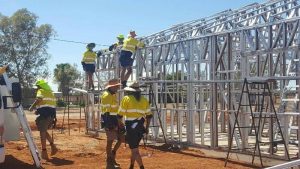Disabling Trauma, The Dormant Oppressor

Ngalla Maya has in the last two months graduated two sets of cohorts into full time employment, many of them former inmates and homeless. (Supplied/Gerry Georgatos)
We all have a story that drags us down, but you can turn your life around.
By: Gerry Georgatos (24 Nov 2017 – NITV)
Though trauma is universal, it can often be unique in terms of its dynamics. This is the case of the devastating effects of the dispossession of Indigenous peoples of the world of their land rights through violence.
In terms of middle to high-income countries with relatively recent colonial oppressor histories, Australia has the biggest divide between its First Peoples and the rest of the population in all its measurable quality of social, health, financial and education indicators.
The result of trauma and dispossession in the context of youth and adult detention of Indigenous peoples is grim. Nearly 100 per cent of the Aboriginal and Torres Strait Islander prisoner population are without a Year 12 completion, more than half have not completed high school. It is estimated that by 2025, one in two of the national prison population will be Aboriginal and/or Torres Strait Islander. The suicide crisis, already catastrophic, is expected to rise above what we see today.
Trauma is cumulative, collective and transmittable. But I believe we must focus on packing it away rather than languishing in it, if we want Indigenous people to thrive.
Overcoming trauma
18 weeks ago, I visited Acacia Prison near Perth and spoke to a group of inmates about the importance of self-belief, as they were soon to be released. They had spent the prime of their life in and out of prison, and had no substantive education or employment history. Three days later, three of them walked out of prison and on that very day walked through the doors of the Ngalla Maya Aboriginal Corporation to embark on a five-week training course.
All three young men completed the training and are now employed, earning thousands of dollars each week in remote housing construction.
Their lives had been consumed by the memories of harrowing childhoods, and they had grown up thinking their traumas were insurmountable. I said to them, ‘just turn up each day to the training’.
The Ngalla Maya 25 seater bus daily transports trainees from their homes or from a designated location to training and back.
Trauma is a part of life, few are unscarred. However for far too many, trauma is overwhelming and debilitating. Trauma becomes the core of their identity and recovery becomes near impossible.
I believe there is a persistent misconception that trauma is to be dealt with gently, patiently, and that it is a lifelong experience, that requires unrelenting management. I don’t think this is the case.
Trauma is always damaging, but it shouldn’t be allowed to dominate an individual.
I believe trauma needs to be acknowledged and understood, but dwelled on in the briefest stretch possible, so that it can be healed to a scar. Who we are should not be reduced to the traumatic events in our lives. We should be the sum of all our experiences, contextualised in the dawn of daily meanings that appear endless.
Trauma, or its treatment, should not corral people into miserable and unproductive lives, or into constant fear.
In the last half century, the study of psychology has complicated our understanding of trauma by telling us that trauma has the ability to shape who we are. There is now a perennial default position of medicalisation and effective incapacitation.
For the First Peoples who suffer pronounced levels of cumulative and collective trauma, these beliefs extinguish hope. There are scores of Aboriginal remote and regional communities where no child completes school, where the majority do not attend, and this has been associated with trauma.
At best, we are sold vacillating emancipating approaches of how to re-engage with society, but the approach of life-long self-management can steal years of life or imprison the mind. This destroys the positive self.
We need to re-educate ourselves so that trauma, whether incidental, cumulative or collective, is not allowed to dominate the individual, a family, a collective, society, or the human discourse. This is not about “moving on” but about not allowing trauma or anyone who professes to be a trauma recovery expert to shut down someone with trauma.
I believe we must identify and acknowledge trauma and do away with it, reduce it to that scar, transform it into a protective factor, and even use it to embolden and empower, to strengthen. Trauma should not become an oppressor.
I think it is possible to change the lives of the poorest and most neglected. When working on trauma recovery work with Aboriginal and Torres Strait Islander families, predominately with those who have been incarcerated, impoverished or affected by suicide, my approach is that behavioural issues should not be trapped into mental health issues.
My colleagues and I have worked alongside scores of Aboriginal and Torres Strait Islanders who were homeless or just out of prison into tertiary education, and with relentless multi-layered psychosocial support, we got them across the line. They graduated and they are leading the way for their families, breaking and ending cycles of poverty and aberrant behaviour.
How do we do it? We improve lives by contextualising traumas and reducing them to healed wounds, as opposed to letting them predominate. There are a number of projects successfully mentoring, training and employing the poorest, those who were chronically unemployed, without an education, illiterate.


Some of Ngalla Maya’s graduates have gone from prison or homelessness to working full time in remote housing construction (Jigalong, Western Australia).
I believe in radical approaches that ask people who have endured traumatic events to remain steadfast in their belief of their positive self, that it need not be interrupted or reduced.
My compassion for others defines my values, but I have a ‘no time wasting’ approach in that trauma-affected people have to get back on their feet, to stay solid-in-their-thinking.
We need to spread the love, but not distort that love to a point that we debilitate others. Even the most affected traumatised people I have worked with, I have urged the radical approach and that you can get back on your feet immediately.
I heard an inmate say to me, “It is best I am here, and best I keep on coming back, because it is the only hope my children have.” Another inmate said, “I have no hope in here but it’s even worse out there.”
The penal estate is not rehabilitative or restorative. There are limited job skills programs, limited education opportunities. The penal estate should invest in people rather than dungeons. Currently, opportunities for healing, psychosocial empowerment, for forgiveness, for redemption, for education skills and qualifications are continually being bypassed.
People are more likely to be good if they didn’t have to go to prison, but supported instead. For those who are sentenced to prison, these must be places where people come first, not last. In working with our most vulnerable sisters and brothers, in changing lives, we must invest in supporting each other, so that trauma can be overcome and packed away.
Recently, a 21-year-old man who had been homeless since he was 14 years old completed a ‘training to employment’ program with Ngalla Maya. He had little formal secondary school education. He lived homeless throughout the training stretch. We picked him up each day and took him to the training. He graduated. He is now employed. Because we believed in him, he began to believe in himself. He is now saving for a private rental home. He will bring his mother out of years of homelessness and with her, his two youngest siblings, a three year old and 15 month old.
There is nothing as profoundly powerful as forgiveness. The forgiving of others validates self-worth, builds bridges and positive futures. Forgiveness, cultivated and understood, keeps families and society solid as opposed to the corrosive anger that diminishes people into the darkest places, into effective mental illness.
Disclaimer: Gerry Georgatos is a suicide prevention researcher and the Humanitarian Projects Coordinator with the Institute of Social Justice and Human Rights. His long-term research focus has been trauma recovery. Gerry has championed the work of the Ngalla Maya Aboriginal Corporation and is also the National Coordinator Support Advocates for the National Indigenous Critical Response Service.

Comments are closed.